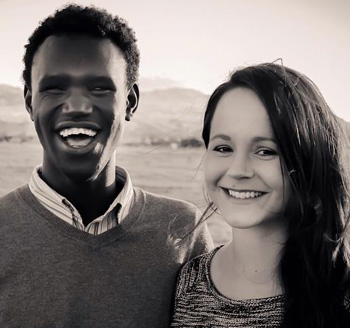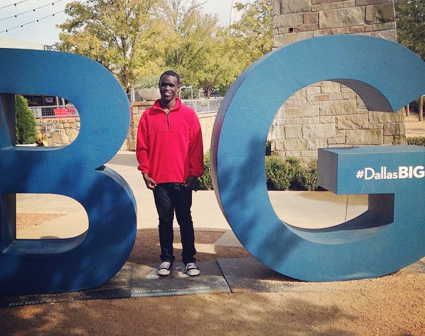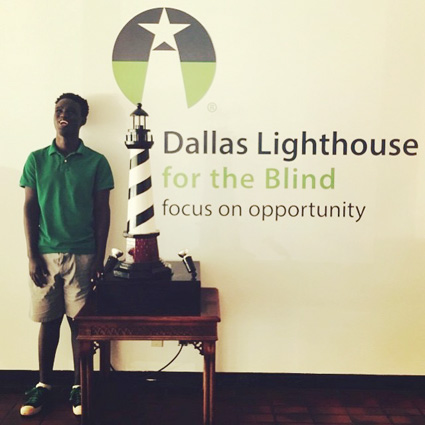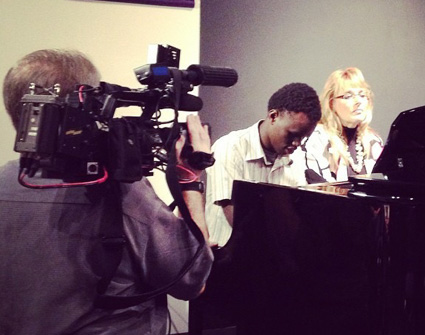DALLAS—When Amie Singleton took time off from her job at Our Children’s House at Baylor University Medical Center to travel to Rwanda and Uganda on a mission trip with an international nonprofit that connects Americans to orphanages in Africa, she never expected God to give her a 21-year-old blind “son.”
 John Hope and Amie Singleton.While Singleton was packing and getting ready for her trip to Africa three and a half years ago, she recently had packed up her marriage. Her divorce—11 months prior to the trip—was unexpected, and she was looking for an opportunity to give back.
John Hope and Amie Singleton.While Singleton was packing and getting ready for her trip to Africa three and a half years ago, she recently had packed up her marriage. Her divorce—11 months prior to the trip—was unexpected, and she was looking for an opportunity to give back.
Singleton had longed for a family. She never set her sights on a career and put most of her energy and efforts into the idea of motherhood. She had hit the lowest point, since her dream of starting a family was now out of her control, and the comfort she felt by depending on a spouse was gone.
“I was fixated on the American dream,” she said. “I was a lukewarm Christian, and my divorce seemed like the worst thing that could happen.”
In her two-year marriage, Singleton suffered from feelings of inadequacy and insignificance. At age 28, with divorce now part of her story, those feelings only deepened. She knew her estranged spouse had turned away, but she feared God, too, would reject her.
Singleton, like every other participant on the mission trip, received a letter of prayer and encouragement from the supporting nonprofit prior to departure. The letter—written as a love letter from God—assured her of Christ’s unchanging love for her.
“This is a season for your heart to be awakened to my love—to encounter and experience my deep passionate love for you beyond words,” the letter said. “As you have a deeper revelation of my love, you will be able to love others as I’ve created you to love.”
 John was blinded when lightning struck his home, killing his family. Sent to a nearby orphanage, he received a new last name – Byiringiro, meaning hope.John was 7 months old when his mother died. At the time, he lived in a Rwandan village. His father, a soldier, died just a few months prior in the country’s humanitarian crisis of the mid-1990s between the Hutu and Tutsi populations, an event that resulted in a devastating genocide.
John was blinded when lightning struck his home, killing his family. Sent to a nearby orphanage, he received a new last name – Byiringiro, meaning hope.John was 7 months old when his mother died. At the time, he lived in a Rwandan village. His father, a soldier, died just a few months prior in the country’s humanitarian crisis of the mid-1990s between the Hutu and Tutsi populations, an event that resulted in a devastating genocide.
One night during a thunderstorm, the unthinkable happened. Lightning struck John’s home, killing his mother and four other babies. Although John survived, the incident left him blind. Since he had no family members to care for him, John was sent to live at a nearby orphanage. Here, he was given a new last name—Byiringiro, meaning hope.
Sign up for our weekly edition and get all our headlines in your inbox on Thursdays
Amie Singleton and John Hope met on a sunny day in 2012. Noel Orphanage was one of about a dozen stops during the mission trip, but something about John struck a chord inside her.
“I was moved by John’s pure joy and love for God,” she said.
He had lived at Noel most of his life. At age 18, he was accustomed to sleeping on the concrete floors, sometimes with a thin mattress and sometimes without. Many times, he abstained from the breakfast porridge, an ill-tasting mixture of powder and water. For lunch and dinner, he consumed a cooked mixture of flour and water called kawunga.
 Initially, surgery looked like an option to reverse the damage to John Hope’s eyes, but American doctors soon found there was no cure.He still managed to thrive—at least as much as he could within his physical and environmental limitations. He learned some English in the orphanage school and refined it by talking to American visitors. Eventually, he served as an interpreter at Noel. He also sang and played piano for the orphanage choir. He spent many hours during the day volunteering to hold the babies living at the orphanage.
Initially, surgery looked like an option to reverse the damage to John Hope’s eyes, but American doctors soon found there was no cure.He still managed to thrive—at least as much as he could within his physical and environmental limitations. He learned some English in the orphanage school and refined it by talking to American visitors. Eventually, he served as an interpreter at Noel. He also sang and played piano for the orphanage choir. He spent many hours during the day volunteering to hold the babies living at the orphanage.
During her time at Noel, Singleton learned all orphanages in Rwanda would close by 2014 due to a lack of government funding. Orphans without living relatives would have no other choice but to make it on their own. Singleton knew John’s blindness prevented him from surviving independently, and he likely would end up homeless.
When she returned to the United States, she couldn’t stop thinking about him.
“I spent a lot of time in prayer,” she said. “It wasn’t long after I returned home that I felt like the best solution for John would be to live in the States.”
For two and a half years, Singleton and John exchanged e-mails and texts and held weekly Skype sessions. What started as a strong desire to keep in touch and help improve John’s situation at Noel by sending him clothes and other items soon turned into a personal calling. She determined to take on the responsibility as John’s caregiver.
Singleton received input and support from strangers and friends alike as she immersed herself in the tedious journey of obtaining a medical visa for John to receive eye care in America.
Friends at Mercy Street Church in West Dallas and professional contacts at Baylor, where she worked as a child-life specialist at Our Children’s House, sponsored fund-raisers for his plane ticket.
She also received the CEO Award from Baylor Scott & White Health, an accolade that comes with monetary compensation—the exact amount needed to hire a Rwandan attorney to assist with paperwork needed to get John to the United States.
But many acquaintances and friends believed Singleton was making a mistake. After all, John was 18 at the time, and she was a young single woman living on a modest salary.
 John Hope now is taking music lessons twice a week and working toward his high school diploma.“How will it look?” they asked. “Is it really up to you to make sure he is OK? Shouldn’t you be focusing on yourself right now? You’re single. Can you handle this?”
John Hope now is taking music lessons twice a week and working toward his high school diploma.“How will it look?” they asked. “Is it really up to you to make sure he is OK? Shouldn’t you be focusing on yourself right now? You’re single. Can you handle this?”
But Singleton insists her faith never failed to provide her a roadmap through sermons, Scripture and prayer—even though at times, she admitted, the map seemed crumpled in the glove compartment.
“God knew what I needed at the right moment,” she said. “Now I know there was a reason for the waiting, for the timing.”
Almost two and a half years after he and Singleton met, John arrived at Dallas/Fort Worth International Airport. His medical visa finally had been approved.
Initially, surgery looked like an option to reverse the damage to his eyes, but American doctors soon saw there is no cure.
So, he and Singleton shifted their focus. Now he takes music lessons twice a week and is working toward his high school diploma. He sings at Mercy Street in West Dallas, as well as at weddings and special events. He hopes to teach and lead music and eventually become a music therapist.
In addition to caring for and homeschooling John, Singleton is studying to earn her master’s degree to become an orientation and mobility specialist. With this degree, she’ll be able to turn her passion for helping people like John into a career. In the meantime, she continues to work part-time as a child-life specialist at Our Children’s House.
Singleton insists she adopted John in her heart long ago, and she refers to him as her son. The duo worked together to obtain his juvenile special immigrant status, which allowed him a green card and a home here. In October, he celebrated his one-year anniversary living in America.
Singleton formed an organization called Hope in His Vision to help other orphans like John who attend the Gatagara School for the Blind in Rwanda. These students lack money for basic needs like soap and toilet paper, and she hopes to connect other people in the United States with them.
At this point, volunteer opportunities exist mainly through monetary or in-kind support, but she plans to enlist volunteers through mission trips and other outreach projects as the organization grows. She expects to receive legal nonprofit status by year’s end.
When asked if she ever thought her journey toward family life would include a 21-year-old, visually impaired Rwandan, Singleton just chuckles.
“It is so funny to see how God works sometimes,” she said. “Honestly, though, I wouldn’t have it any other way.”















We seek to connect God’s story and God’s people around the world. To learn more about God’s story, click here.
Send comments and feedback to Eric Black, our editor. For comments to be published, please specify “letter to the editor.” Maximum length for publication is 300 words.